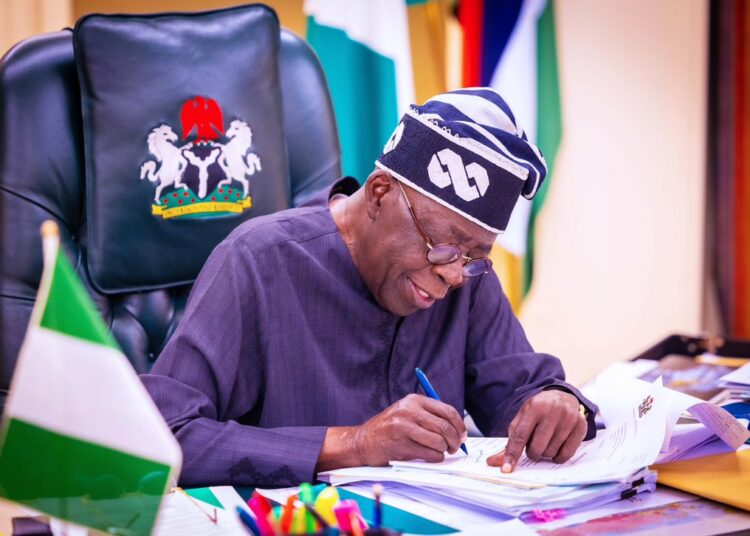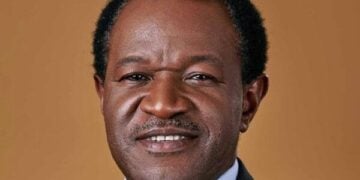Experts have expressed divergent opinions over the federal government’s plan to raise a fresh $2.84 billion loan.
They expressed their views following President Bola Tinubu’s letter to the House of Representatives seeking the approval of the plan.
Recall that Tinubu in separate letters to Speaker Abbas Tajudeen at plenary on Tuesday, also sought the resolution of the House to approve $2.347 billion external borrowing as well as the issue of a stand-alone debut Sovereign Sukuk of up to $500 million in the ICM with or without credit enhancement (Guarantee).
Speaking in an interview with LEADERSHIP, Johnson Chukwu, the chief executive of Cowry Assets Management Limited, queried the need for the government to seek approval after it announced last month that there would be no more borrowing this year.
“I think the first question we have to ask is: the government said they had met their full-year revenue projection as of August, and they also said they had ceased borrowing. Those statements were made in September of last month. So what changed? Was the government’s revenue assumption not real? If they had already met their projected revenue estimate, what then is the purpose of the additional borrowing?
“We need to put this in context. What is the revenue shortfall for? Do we actually have a revenue shortfall? If we must borrow additionally, must we borrow externally, given the volatility of our foreign sources and our existing foreign currency obligations?
“Additionally, are we funding recurrent expenditure, or are we funding capital expenditure that is truly required? There are too many questions,” he pointed out.
He noted that, if the borrowing is for refinancing maturing Eurobonds, where “they are able to borrow at a lower rate than what we are currently paying on the Eurobonds, I wouldn’t have any problem with that. If the borrowing cost is going to come down, we would still have the same level of foreign currency exposure, but at a lower price. That would make sense.
“But we need to see a proper breakdown. The economy has not met the revenue expectations regarding funding the budget deficit. That is at variance with the government’s claim. So, we are hearing one thing from the government and seeing another thing in the economic data within a matter of weeks.
“I have no objection to refinancing maturing Eurobonds, provided the refinancing cost is cheaper than the initial coupon on the maturing bond. Otherwise, since we have a reasonable level of foreign reserves, we should use those reserves to pay off that loan, and borrow only when financing costs are lower. If the refinancing is cheaper, I will support it.”
On the contrary, the chief executive of CFG Advisory, Tilewa Adebajo said: “Eurobond financing is a very structured and planned process so this is not a surprise.
The approval process at the house might have been delayed. While the total debt profile has hit about $100 billion, the recent Medium Term Debt Strategy review suggests sustainability as the increase in revenue with the subsidy savings has improved significantly all the debt servicing numbers and ratios.”
The debt instruments being used, according to him, is also capital market sources and the discontinuation of ways and means has in no small measure, contributed to the economic stability we are experiencing now.”
Meanwhile , a former Student leader n Osun State, Comrade Abosede Busayo Oluwaseun said, it was quite unfortunate that despite the huge gains Nigeria had made and was making on subsidy removal and the FX reforms, Nigeria was still hugely borrowing to survive and practically not to grow.
“And this is because of failure to plan, poor accountability, and economic short-sightedness. The expected benefits of subsidy and FX reforms are not felt by you and i, the ordinary people.
“We were promised financial dependence as the reason why those two hard policies were inflicted on Nigerians, yet there’s no gain to show for it. In 2024 alone, record has it that we spent over N8.25 trillion on debt servicing, if you look at our income record, that almost amounts to what we saved from subsidy.
“And now of what importance is borrowing to go and fund the Coastal High way, when all the entire Federal roads in South West are no longer motorable except Lagos-Ibadan expressway. Visit the route from Lagos to Ore, to Ogbomosho, to Osun, to Akure, they are death traps and not palatable to travellers.”
President Bola Tinubu had earlier written to the House of Representatives seeking the approval of plans by the Federal Government to raise 2.34 billion dollars in external capital. The fund is aimed at financing part of the 2025 budget deficit and refinancing maturing Eurobonds.
The Speaker, Rep. Abba Tajudeen, read the president’s request on the floor of the house on Tuesday. Tajudeen said, the president also sought parliamentary approval for the issuance of a 500 million dollar debut sovereign Sukuk in the international capital market.
He said that the request was made in accordance with the provisions of Sections 21(1) and 27(1) of the Debt Management Office (DMO) Establishment Act 2003.
According to the president, the total external capital to be raised amounts to 2.347 billion dollar, comprising 1.229 billion dollar in new external borrowing provided for in the 2025 Appropriation Act and 1.118 billion dollar. He further stated that the money was to refinance maturing Eurobonds due in November.
Tinubu said that, the borrowing would be sourced through a mix of Eurobond issuance, loan syndications, bridge financing and direct borrowing from international financial institutions, depending on market conditions. He said that, the new financing was part of the government’s strategy to support infrastructure development, refinance costly debt obligations and sustain investor confidence in Nigeria’s credit market.
The president sought for the legislature’s authorisation for the issuance of a stand-alone 500 million dollar sovereign Sukuk in the international capital market — the first of its kind for Nigeria. He said that the Sukuk would diversify Nigeria’s funding sources, attract ethical investors and complement domestic Sukuk issuances that had raised over 1.39 trillion dollar since 2017 for critical road projects across the country.





